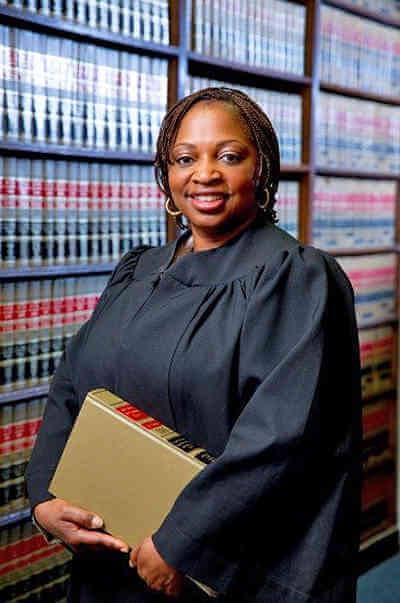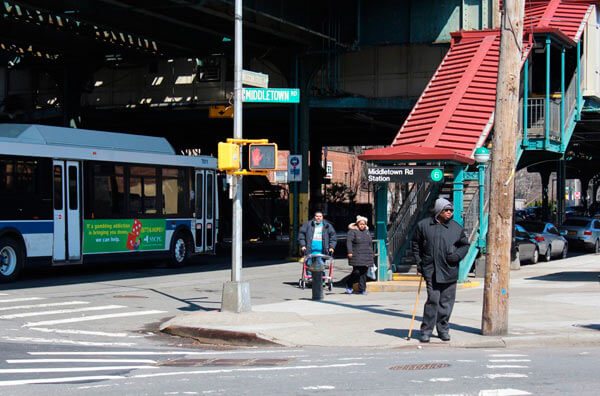After serving six years as a Civil Court judge in Brooklyn, Justice Kathy J. King was appointed an acting Supreme Court Justice in 2009, where she presided over criminal and civil court matters.
Prior to that, in 2003, Justice King was elected to Civil Court, Kings County.
In 2014, she was elected to the New York State Supreme Court in Brooklyn.
In an exclusive Caribbean Life interview over the weekend, Justice King, a Brooklyn resident, reminisced about her Caribbean upbringing and her pursuit of law, among other things.
“I am the daughter of Caribbean immigrants who were born in Montserrat, British West Indies,” she said. “Although my mother and father had no formal education, they stressed the value of education to me and my sister, as a means of achieving personal growth, opportunity and advancement.
“Their values and unwavering support motivated me to be the first in my family to attend college and graduate school,” Justice King added. “While I was raised in St. Albans, Queens, my fondest memories growing up were of time spent in the Caribbean. My mother would send my sister and me to spend summers in Montserrat.
“Just travelling to Montserrat was an adventure,” she continued. “From New York, we would fly into Antigua and then catch a ‘puddle jumper’for the 20-minute flight from Antigua to Montserrat. Once arriving in Montserrat, it was total immersion into Caribbean way of life — sun, surf and, of course, the warm embrace of our family and friends on the island.
“As an adult, I often seek refuge from the hectic pace of work and my other responsibilities by hanging out at a local beach or, if time permits, traveling to the Caribbean,” Justice King said.
In 2014, King was the recipient of Montserrat Progressive Society’s Mother of the Year Award, which recognized her accomplishments as a trail blazer and working mother.
She said her interest in pursuing a career in law was nurtured by Judge Kenneth Browne, with whom she interned during college in the mid-70s. Judge Browne was the first African American judge elected to Civil and Supreme Court in Queens County.
Justice King said her internship coincided with the end of the Vietnam War, the progressive movement in American Society, and was the catalyst for her to attend law school since, she said, she discovered that the law can be used as a “vehicle for social change.”
Prior to enrolling at the State University of New York Buffalo Law School, Justice King said she attended City College’s Urban Legal Studies Program.
As the first in her family to attend an institution of higher education, she said life in law school was challenging.
Notwithstanding the challenges, however, she said she was able to graduate “through support of family and a steadfast determination.”
After law school, Justice King said she returned home, and, shortly thereafter, purchased a brownstone, moving to the Bedford-Stuyvesant section of Brooklyn.
“As a resident of Bed-Stuy for almost 30 years, it is amazing to see the transformation in the neighborhood from the late 1980s, when there was an abundance of abandoned and sealed-up buildings to the burgeoning development that is presently taking place on every block in the neighborhood,” she said.
After law school graduation, Justice King said her career trajectory was greatly influenced by responsibilities as a care provider for her aging mother and cousin, who lived in Montserrat.
“Little did I know that my experiences as a care provider, which included advance directives and elder law planning, would provide the foundation for my future assignment as a guardianship judge in Supreme Court,” she said.
Justice King noted that her career path to the bench did not result solely from her own desire and initiative but was, in large part, due to encouragement by others.
“My closest friends conveyed to me that temperance, maturity, the ability to discern, and humility were character traits that I possessed, and believed that I would make an excellent candidate for judicial office,” she said.
Often referred to as “the People’s Court,” since many of the parties appearing in Civil Court are self-represented, Justice King said she found Civil Court to be “extremely rewarding.”
“As a jurist, I had the privilege of crafting practical solutions to issues presented,” she said.
Civil Court hears cases worth up to $25,000.
But Justice King said her most challenging assignments as a judge occurred during her tenure as an acting Supreme Justice.
She said the Office of Court Administration requires that acting Supreme Justices preside in criminal court arraignments six times a year.
Justice King said many of the parties who are being arraigned are individuals with mental health issues, youthful offenders, and/or substance abusers.
“The decision to release or to keep a defendant in custody is particularly challenging, since the court must also consider and weigh the district attorney’s recommendation regarding a particular defendant,” she said.
As an acting Supreme Court Justice, King also presided as a guardianship judge, where she determined whether an individual is physically or mentally incapacitated.
“The responsibility to make such a decision can be particularly challenging, since an individual’s right to make independent decisions is at stake,” she said.
“If a determination of incapacity is made, and a guardian is appointed, the court must ensure that the guardian is acting in the best interest of the incapacitated person,” she added. “This can be very difficult, because the court must rely on a guardian who is substituting his judgment for the incapacitated person, who he has become familiar with through court papers.”
King said justices in Kings County preside over the “most voluminous caseload in the state.”
“One of my greatest challenges as a judge is ensuring that the parties appearing before me receive their day in court, and are allowed to present their case in a fair and equitable manner,” she said.
Justice King, however, said one of her notable achievements on the bench has been her success at decision writing.
To date, she said she has 15 published decisions in the State Reporter, the official compilation of decisions of New York’s trial and appellate courts.
Additionally, Justice King said she is “actively involved” in the National Association of Women Judges (NAWJ), an organization dedicated to preserving judicial independence to women and minorities, increasing the number and advancement of women judges, and providing judicial education.
Justice King previously served on NAWJ’s Board of Directors. She is a former past president of the NAWJ’s New York Chapter, and currently serves as co-chair of NAWJ’s membership Committee.
Recognizing the importance mentoring and empowering the next generation of women in the legal profession, Justice King said she mentors newly-elected judges and lawyers, and law students.
She also provides internship opportunities in her chambers.
Consistent with the NAWJ’s mission of empowering young women leaders, in 2018, Justice King said she became a member of the Board of Trustees of St. Barnabas High School, an all girls’ high school in the Bronx.
“I am hopeful that my work in the NAWJ inspires others to put their unique stamp on women in the legal profession,” she said.
Justice King and her husband, Edward H. King, Esq., have been married for 27 years and have three adult children.
Justice King said she first met Edward while they were students in the Urban Legal Studies Program at City College.
“It wasn’t until a decade after graduation that we reconnected and became a couple,” she disclosed.


















